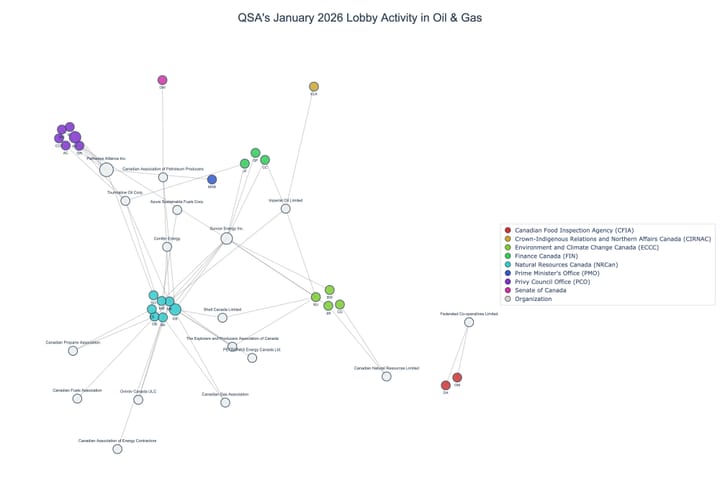QSA's Week in Oil & Gas (#43, 2025)
G7 Energy Ministers advance critical minerals alliance and energy security pledges; Canada issues defence stockpiling order for critical minerals; major federal investments in CCUS and AI; joint Canada–Germany LNG talks; Senate and Commons review offshore regulations and emissions targets; US DOE...

Good morning! This is Queen Street Analytics' weekly roundup of regulatory developments, legislative discussions, political announcements and other government-related news concerning oil and gas production, wells, drilling, petroleum and fuels refining, pipelines, LNG, hydrocarbons, and all Landman fans. Every Monday, we break down the most important updates in this space in under five minutes.
Want to track the upstream and downstream forces affecting Oil & Gas? Don’t miss this week’s updates in Utilities & Power and Mining.
Dates: 2025-10-26 to 2025-11-01
📋 In This Week's Newsletter
• 🏛️ This Week's Parliamentary Committee Calendar
• 🇨🇦 Canadian Federal GR News
• 🇺🇸 US Federal GR News
• 🗺️ Canadian Provincial GR News
• 💬 Government Consultations
• 📚 What We're Reading This Week
This Week's Parliamentary Committee Calendar
- Senate ENEV: Ongoing Study of Newfoundland and Labrador’s Offshore Petroleum Industry: The Standing Senate Committee on Energy, the Environment and Natural Resources will examine Newfoundland and Labrador’s offshore petroleum industry on November 4, with Professor Brian Veitch of Memorial University of Newfoundland scheduled to testify.
- Senate ENEV: Offshore Petroleum Industry Study Continues: A follow-up session on Newfoundland and Labrador’s offshore petroleum industry will be held by the Senate ENEV committee on November 6; additional witnesses are expected.
- Senate TRCM: Essential Services in Rail and Marine Sectors: On November 5, the Senate Transport and Communications Committee will discuss maintaining activities in federally regulated rail and marine sectors during labour disruptions, with witnesses from the Canadian Federation of Independent Business and the Chemistry Industry Association of Canada.
- Senate POFO: Ocean Carbon Sequestration Study and Draft Agenda Review: The Senate Fisheries and Oceans Committee will hold an in camera session on November 4 to examine ocean carbon sequestration and review a draft agenda.
- Senate POFO: Ocean Carbon Sequestration Study: Ocean carbon sequestration and its use in Canada will again be addressed by the Fisheries and Oceans Committee on November 6, with witness testimony scheduled.
- House SRSR: Private Sector Investment in Research and Development: On November 3, the House Committee on Science and Research will hear from Axelys, McMaster University, Polytechnics Canada, the Centre for International Governance Innovation, and others during their study on boosting private sector R&D investment in Canada.
Canadian Federal GR News
Canada Issues Defence Production Act Order to Stockpile Critical Minerals
On October 31, the Government of Canada, through Minister of Energy and Natural Resources Tim Hodgson, confirmed an Order in Council under the Defence Production Act designating critical minerals as essential to Canadian defence and national interests. This move establishes a new defence stockpiling regime and supports multilateral efforts, contributing to NATO and defence spending requirements. The federal government also announced 26 strategic projects and investments under the G7 Critical Minerals Production Alliance, unlocking $6.4 billion in Canadian projects tied to sectors such as graphite, scandium, and rare earth elements. Several Canada-based facilities involved in synthetic graphite and rare earths processing have secured offtake agreements and direct federal support.
Sources: Announcements: www.canada.ca

G7 Ministers Launch Energy Security and Innovation Initiatives under Canada’s Presidency
G7 Energy and Environment Ministers met in Toronto to advance energy security, supply chain resilience, and innovation agendas, with Canada acting as host and coordinating the summit’s outcomes. The joint G7 'Call to Action on Enhancing Energy Security' focused on strengthening electricity grids, securing critical minerals supply chains, and promoting efficient permitting for infrastructure projects. The G7 also released statements on responsible nuclear and fusion energy deployment, actions for the circular economy in critical minerals, and a new AI work plan for energy applications. Notably, the Ministers reaffirmed support for Ukraine’s energy system reconstruction via the G7+ Ukraine Energy Coordination Group and signaled $10 million in expedited Canadian funding through the Ukraine Energy Support Fund.
Sources: Announcements: www.canada.ca
Major Federal Investments Announced in Carbon Capture and AI Solutions
Canada’s Minister of Energy and Natural Resources announced over $11 million in funding for four carbon capture, utilization, and storage (CCUS) research and demonstration projects. Projects include assessments of carbon storage potential in Atlantic Canada and Quebec and support for digital tools to map Eastern Canadian storage reservoirs. The Institut national de la recherche scientifique and Université Laval in Quebec are among the recipients, working on pilot-ready geological storage and integrated mineralization for critical metal recovery alongside CO2 sequestration. Additionally, the minister launched an AI for Canadian Energy Innovation call, with up to $10 million available for high-impact research, development, and deployment projects designed to accelerate domestic AI applications in the energy sector.
Sources: Announcements: www.canada.ca
Canada-Germany Energy Talks Advance LNG and Critical Minerals Cooperation
At the G7 meeting in Toronto, Minister Hodgson met with Germany’s Federal Minister for Economic Affairs and Energy, Katherina Reiche, to discuss critical mineral supply chains and bilateral LNG collaboration. Officials reviewed progress under their Critical Minerals Action Plan, examined short-term operationalization of minerals projects, and discussed linking Canadian LNG suppliers with German industry. The two countries pledged further engagement with mining, CCUS, and energy stakeholders to develop strategic partnerships, reflecting the broader effort to diversify energy trade and industrial decarbonization links between Canada and Europe.
Sources: Announcements: www.canada.ca
G7 Endorses AI Work Plan for Energy Grid Innovation and Management
G7 ministers have agreed to a new AI and Energy Work Plan, created with the International Energy Agency and industry stakeholders. The plan recommends that data centers and AI operations be reliably powered through diversified technologies and technical solutions, with industry and governments collaborating to monitor energy demand, improve grid reliability, and share best practices. Canada has initiated a $10 million funding call to support AI innovation in the energy sector, and it has contributed data and expertise to the IEA’s Energy and AI Observatory, which will produce real-time data and technical roadmaps for AI use across energy systems.
Sources: Announcements: www.canada.ca
StatsCan Releases Primary Energy Production and Manufacturing Energy Use Data
Statistics Canada reported that primary energy production in August 2025 grew 2.9% year-over-year to 2.1 million terajoules, with increases across five of six measured sectors. Separate annual data show that manufacturing sector energy consumption in 2024 declined 2.3% from 2023, continuing a downward trend that began in 2022 and totaling 2,090.1 petajoules.
Sources: Open Government Data Set: www.statcan.gc.ca, Open Government Data Set: www.statcan.gc.ca
Parliamentary Committees Review Offshore Petroleum Regulation, Emissions, and Regional Assessments
Senate and House committees met to examine the regulatory environment and operational risks for Newfoundland and Labrador’s offshore oil sector. The Canada-Newfoundland and Labrador Offshore Energy Regulator reported on enhanced safety measures, the implementation of performance-based regulatory practices, and international cooperation. Regional assessments focusing on exploratory drilling and environmental impact have increased the efficiency of project reviews. Committee members inquired about emissions constraints, the limited uptake of offshore renewables, and regulatory responses to past spills and systemic safety issues. The Canada Energy Regulator outlined partnerships with regional regulators and discussions addressed data gaps in emissions monitoring, stranded asset risk, and geopolitical pressure on oil production.
Sources: senparlvu.parl.gc.ca, senparlvu.parl.gc.ca
Canada and G7 Partners Advance Ukraine Energy Support and Bilateral Declarations
The G7 energy ministers’ meeting led to a Joint Declaration of Intent on Energy Cooperation between Canada and Ukraine, supported by the expedited disbursement of $10 million from Canada’s $70-million contribution to the Ukraine Energy Support Fund. Minister Hodgson and his Japanese, Italian, and Australian counterparts held side meetings, resulting in new joint declarations on energy security, LNG, and critical mineral cooperation. Japan and Canada agreed to promote resilient and low-emission LNG supply chains, and Canada–Italy dialogues will prioritize critical minerals and nuclear innovation.
Sources: Announcements: www.canada.ca
Energy Innovation Forum and Industry Roundtables Lay Out Federal Funding Priorities
Through keynote addresses and the Energy Innovation Forum, Minister Hodgson detailed federal measures for accelerating energy project approvals, supporting electricity grid modernization, and strengthening regulatory predictability via the new Major Projects Office. Canada’s critical minerals production and export strategy was highlighted, including more than $80 million for domestic and international projects focused on supply chain resilience and skills development. The federal government is prioritizing LNG expansion, small modular nuclear reactors, and CCUS as major opportunities for industry investment and export diversification.
Sources: Announcements: www.canada.ca, Announcements: www.canada.ca, Announcements: www.canada.ca
House of Commons Committees Hear Testimony on CUSMA, Energy Exports, and Industrial Carbon Markets
The International Trade Committee (CIIT) reviewed the North American trade agreement’s implications for energy and forest products exporters. Export Development Canada officials described increased trade uncertainty and growing demand for Canadian LNG in Asia and Europe. The Standing Committee on Environment and Sustainable Development (ENVI) examined industrial carbon pricing with testimony from Clean Prosperity, the Pembina Institute, and Keystone Agricultural Producers. Discussions included the role of carbon markets in achieving 2030 emissions targets, sector-specific decarbonization, Indigenous engagement, and the limitations of electric vehicle mandates in rural sectors.
Sources: parlvu.parl.gc.ca, parlvu.parl.gc.ca
Senate Committees Discuss Ocean Carbon Sequestration and Marine CDR Standards
The Senate Committee on Fisheries and Oceans met to discuss Canada’s marine carbon dioxide removal (mCDR) potential, with testimony emphasizing the nation’s three-ocean geography and the need for coherent national standards on monitoring, reporting, and verification. Witnesses called for government action on regulatory frameworks to support marine carbon sequestration R&D, addressing data uncertainties, and responding to proposed international restrictions on ocean-based research.
Sources: senparlvu.parl.gc.ca
US Federal GR News
US Department of Energy Expands Loan Guarantees for Fossil Fuel Infrastructure Projects
The US Department of Energy issued an interim final rule expanding eligibility for its loan guarantee program under the One Big Beautiful Bill Act. The new 'Energy Dominance Financing' amendments remove prior requirements for projects to demonstrate emissions reductions, broadening support to projects increasing capacity or supporting grid reliability of fossil fuel assets. The amendments authorize up to $250 billion in federal loan guarantees through 2028 for US-based fossil fuel and related energy infrastructure, and relax application requirements related to community benefits analyses.
Sources: www.federalregister.gov
US EPA Renews Renewable Fuel Standard Annual Rules Information Collection
EPA requested comments on a proposed renewal of its Renewable Fuel Standard (RFS) Program Annual Rules information collection. The extension, covering biointermediate producers and RIN generators, is expected to reduce reporting burden due to fewer parties utilizing biointermediates in the RFS than previously estimated.
Sources: www.federalregister.gov
Pipeline Safety Administration Seeks Comments on Southern Natural Gas Special Permit Extension
The US Pipeline and Hazardous Materials Safety Administration is soliciting public feedback on an extension to special permit PHMSA-2020-0007 for Southern Natural Gas Company. The extension would adjust compliance requirements under Federal pipeline safety rules for a 997-foot pipeline segment in Georgia.
Sources: www.federalregister.gov
EPA Renews Air Emissions Reporting and Stationary Combustion Turbines NSPS Collections
EPA has renewed information collection requests for the Air Emissions Reporting Requirements and for the NSPS for Stationary Combustion Turbines (Subpart KKKK). The Air Emissions Reporting renewal updates state, local, and tribal agency burden estimates, now including reporting by 12,379 owners/operators. The NSPS extension reflects an increase in regulated sources and maintains requirements for performance tests, operating records, and emissions notifications for turbines installed or modified after 2005.
Sources: www.federalregister.gov, www.federalregister.gov
EPA Proposes Approval of Alaska’s Regional Haze Plan
EPA proposed to approve Alaska’s regional haze plan for the second implementation period, finding that required emissions control measures for key industrial sources—including several coal-fired power plants—are not cost-effective beyond stated requirements. The plan addresses emissions of sulfur dioxide, regional haze, and the projected impacts on visibility at designated Class I Federal areas.
Sources: www.federalregister.gov
Canadian Provincial GR News
Ontario Awards Feasibility Study for New East-West Pipeline Corridor
Ontario’s government announced it has commissioned a feasibility study to assess an East-West pipeline and energy corridor linking Western Canadian oil and gas with Ontario refineries and ports, with plans to use Canadian steel and infrastructure for the proposed project.
Sources: news.ontario.ca
Ontario Launches New Round of Hydrogen Innovation Fund
Ontario is investing $30 million in a new round of the Hydrogen Innovation Fund, doubling prior funding and expanding eligibility to cover both grid integration and hydrogen sector applications, including hydrogen production, transportation, and industrial use.
Sources: news.ontario.ca
New Brunswick to Remove Cost of Carbon Adjuster on Fuel
New Brunswick announced it will remove the cost of carbon adjuster from the province's regulated fuel price formula effective December 1, an adjustment expected to lower gasoline prices by 7–9 cents per litre.
Sources: www2.gnb.ca
Alberta Delegation to Attend ADIPEC 2025
Alberta Minister Joseph Schow will lead a trade delegation of over 70 oil and gas companies to the Abu Dhabi International Petroleum Exhibition and Conference, aiming to increase investment ties between Alberta and the UAE.
Sources: www.alberta.ca
Nova Scotia Premier Begins Energy Mission in Alberta and Texas
Nova Scotia Premier Tim Houston will visit Alberta and Texas to promote provincial energy initiatives following recent regulatory and legislative changes, including new offshore wind and petroleum bid processes and the lifting of the ban on hydraulic fracturing.
Sources: news.novascotia.ca
Government Consultations
Canadian Marine Advisory Council Fall 2025 Consultation Announced
Transport Canada is inviting stakeholders to attend the Canadian Marine Advisory Council in November to discuss marine safety and security regulations.
Sources: Canadian Government Consultations: tc.canada.ca
What We're Reading This Week
- The Globe and Mail: Talks to capture oil sands industry emissions in Alberta are gathering momentum and could impact long-term decarbonization strategies.
- The Globe and Mail: Ontario launches study on an East-West energy corridor, raising prospects for major new oil and gas infrastructure.
- CBC News: BC Energy Regulator increases orphan oil and gas well site levy to $24 million to address environmental liabilities.
- The Globe and Mail: The G7 commits to Ukraine's energy security, with Canada advancing emergency funds for critical infrastructure.
- The Star: Doug Ford launches a feasibility study for a possible east-west oil pipeline corridor.
- The Star: Proposal in BC to reduce taxable value of pipelines draws criticism over local fiscal impacts.
- The Star: NGen partners with Carbonhound to expand emissions reporting for the Canadian manufacturing sector.
- The Star: Smackover Lithium receives final integration approval from the Arkansas Oil and Gas Commission for its South West Arkansas project.


